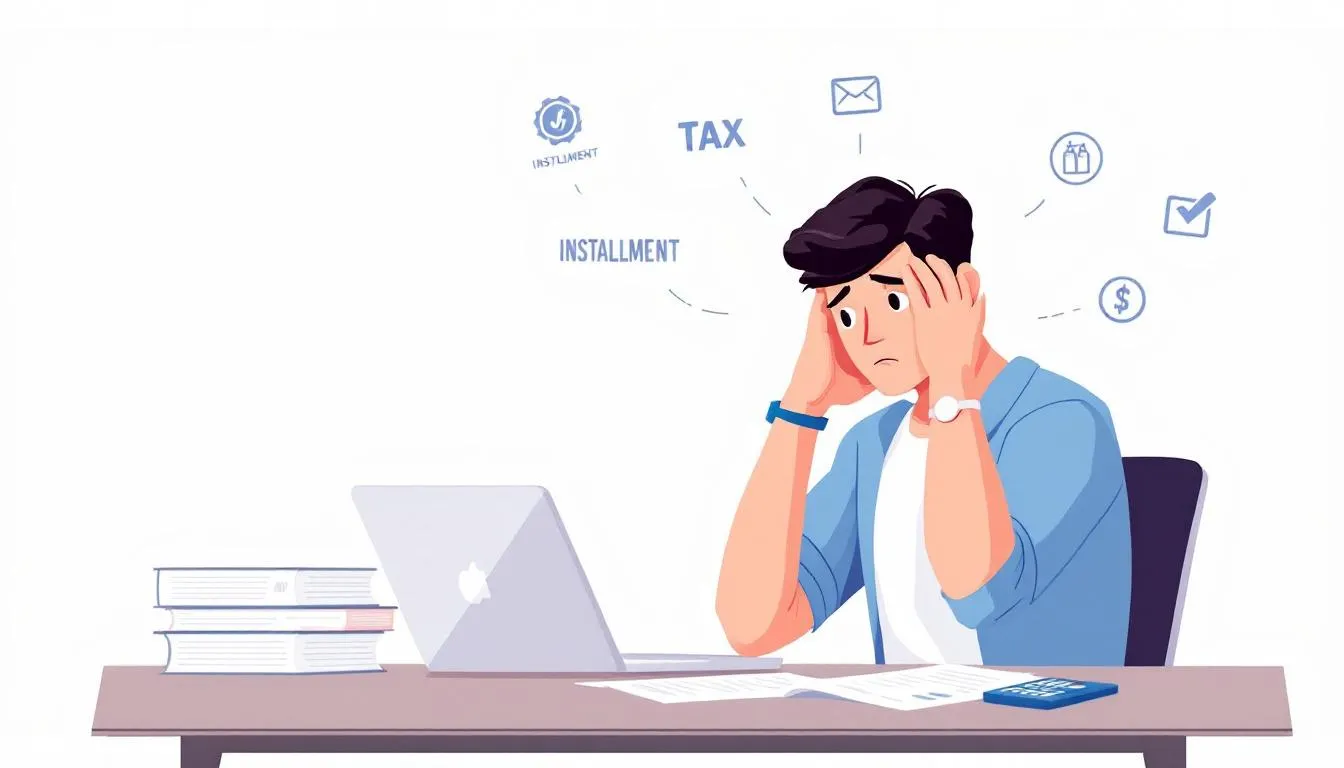Can I miss an IRS installment payment? The short answer is no, but there are options for those who are struggling to pay. This article will walk you through the rules, the consequences and your options.
Note: Missing an IRS installment payment can result in penalties, interest or even collection actions so make sure you understand the risks before you do anything.
Key Points
- You can’t miss an IRS installment payment; however, taxpayers in extreme financial hardship can request a temporary suspension with IRS approval.
- Missing a payment can have severe consequences including a penalty and the IRS will terminate your installment agreement. This can trigger collection activity like liens, levies and other enforcement actions.
- Taxpayers should contact the IRS as soon as possible if they miss a payment to explore options like modifying payment plans or reinstating defaulted agreements.
Can I Miss an IRS Installment Payment?

Although you can’t skip payments, there are circumstances where you can temporarily suspend. Installment agreements are for those who can’t pay taxes in full immediately. Taxpayers in extreme financial hardship might qualify for this relief but it requires communication and approval from the IRS.
Missing an installment payment can have serious consequences including defaulting your agreement and additional penalties and interest. Not paying taxes or addressing unpaid taxes you owe can also result in further consequences like enforced collection actions. Understanding your obligations and exploring alternatives is key to staying compliant with your IRS payment plan.
What Happens If You Miss a Monthly Payment?

Failing to make a payment may result in IRS penalties:
- Terminating your installment agreement
- Initiating collection actions, such as a IRS levies on your assets, garnishing wages, or seizing bank funds
- Filing tax liens, further complicating your financial situation
A recent tax bill or unpaid taxes from a previous tax year can also trigger default on your agreement or lead to IRS collection actions.
Stay current on your account payments to avoid these severe consequences.
Immediate Consequences of Missing a Payment
Missing a payment on your IRS installment agreement has immediate consequences. There’s no grace period so you need to correct the missed payment right away, usually within 30 days. Making estimated tax payments can also help prevent missing future installment payments and keep your agreement in good standing.
Not addressing the missed payment within this window results in unpaid taxes which can add up to more penalties and interest quickly and make your tax debt harder to manage. Action is needed to avoid further financial strain.
IRS Notices You Might Receive
If you miss a payment the IRS will send you official notices like Notice CP523 which will inform you of the missed payment and warn of levy actions on your assets if the default is not cured. You may also receive IRS Letter 2975 which serves the same purpose.
The IRS may also request an IRS collection information statement to assess your financial situation and determine your eligibility for an installment agreement or other resolution options.
After receiving a CP523 notice you have 30 days to pay or contact the IRS to discuss your situation. Ignoring these notices can lead to collection activity like levies or liens so prompt response is key to address your missed payment.
Options to Avoid Defaulting on Your Installment Agreement
Being proactive is key to avoid defaulting on your IRS installment agreement. One way is to explore options to modify your payment plan, such as switching to a lower monthly payment or extending the repayment period for more manageable installment agreement payments. If you have an existing payment plan, you may need to modify it if your financial situation changes.
If you can’t make a payment consider the following:
- Contact the IRS immediately to discuss your situation.
- The IRS may offer a temporary delay in payments if you’re in financial hardship.
- You may need to submit a collection information statement (Form 433) when requesting changes to your payment plan.
- The Taxpayer Advocate Service (TAS) can help taxpayers in distress.
Acting quickly can help avoid default and accumulating interest and penalties. If you accrue a new balance due to additional tax debt, you may need to set up a new plan with the IRS.
Changing Your Payment Date
Changing your payment date can match your IRS installment payments with your financial situation. The IRS allows you to choose a payment due date from the 1st to the 28th of the month.
Changing the payment date ensures you have the funds available when the payment is due, reducing the chance of missed payments. This is useful if your income varies or you have unexpected expenses.
Requesting a Modified Payment Amount
If you can’t make your current monthly payments, requesting a modified payment amount might be an option. The IRS allows taxpayers to use the Online Payment Agreement application to request changes but changes to direct debit installment agreements require direct contact with the IRS. Making a full payment is always an option if you can do so, as it will pay off your tax debt in full and stop collection activity.
Requesting a lower monthly payment based on your current financial situation can help you stay current with payments. Proactive management of your payment agreement helps avoid default and the associated penalties and interest. To qualify for a modified payment amount you must have filed all required tax return documents.
What to Do After Missing a Payment
I
Contact an IRS representative to discuss your missed payments and options. Key points to consider:
- Negotiating a new installment agreement may require proof of your current financial situation.
- Communicating with the IRS about your payment issues will allow you to explore alternatives to default.
- This will help you avoid negative consequences.
Important Note From our Atlanta and Chicago CPA Firm: To remain eligible for payment plans, make sure to file all required tax returns. The IRS will not negotiate with you if you have not filed all of your tax returns during the last 6 years. If you have unfiled tax returns or if you are not up to date with your quarterly tax filings, call our office to get caught up as soon as possible.
Contact the IRS
Call the IRS as soon as you recognize a payment issue. Taxpayers facing financial hardship should inform the IRS about their situation to explore options. Contacting a tax professional can also provide guidance.
Taxpayers can use the Online Payment Agreement application to request a modification of their payment amount. However, changes to direct debit installment agreements require direct communication with the IRS.
How do I reinstate a defaulted agreement?
To reinstate a defaulted agreement, prompt communication with the IRS is essential, including settling any missed payments. You must be able to make the agreed payments moving forward to reinstate your installment agreement. If you have an existing payment plan, you may need to update it to include any new balance owed to the IRS.
Financial documentation might be necessary to support a reinstatement request for financial information. There may be a reinstatement fee associated with reinstating an installment agreement unless waived due to financial hardship. Taxpayers can appeal the IRS’s decision through the Collection Appeals Program if rejected. If reinstatement is not possible, you may need to set up a new plan with the IRS.
Alternatives to Skipping a Payment
If you’re unable to make a payment, consider alternatives instead of skipping it. One option is filing for Currently Not Collectible status, a designation for individuals who cannot pay their tax liabilities due to lack of income or assets. If you are unable to pay taxes for a specific tax year, you should explore alternative arrangements with the IRS to address your situation.
When to Seek Professional Help
If you’re struggling to manage your IRS installment payments, seeking professional help can be beneficial. Consulting a CPA or other tax professional can offer guidance and support when payments are missed. Tax resolution professionals can assist with complicated tax issues, ensuring effective navigation of the system.
Tax resolution professionals can help in several ways:
- Develop repayment plans tailored to a taxpayer’s financial situation.
- Simplify communication with the IRS, making it less stressful.
- Negotiate with the IRS on behalf of taxpayers, potentially leading to better settlements.
Summary
In summary, managing your IRS installment agreement payments is crucial to avoid severe consequences. While you cannot skip payments, there are options to modify your payment plan or request temporary relief due to financial hardship. Taking proactive steps and communicating with the IRS can help you stay on track and avoid defaulting.
Remember, if you’re struggling to manage your payments, seeking professional help can provide the guidance and support you need. By staying informed and proactive, you can effectively manage your IRS installment agreement and avoid the negative repercussions of missed payments.
Frequently Asked Questions
Can I skip an IRS installment payment?
You cannot skip an IRS installment payment, but you may request a temporary suspension under certain circumstances. It’s crucial to adhere to your payment schedule to avoid penalties.
What happens if I miss a monthly payment on my IRS installment agreement?
Missing a monthly payment on your IRS installment agreement can result in the termination of the agreement and may trigger collection actions, including asset levies, wage garnishments, and bank account seizures. It’s crucial to stay on track to avoid these severe consequences.
How can I avoid defaulting on my installment agreement?
To avoid defaulting on your installment agreement, consider modifying your payment plan or requesting a lower monthly payment by contacting the IRS directly. Staying proactive about your financial situation is crucial.
What should I do if I receive a Notice CP523?
If you receive a Notice CP523, act quickly by paying the balance owed or contacting the IRS within 30 days to discuss your options and prevent potential asset levies.
When should I seek professional help for managing my IRS installment payments?
If you’re finding it difficult to manage your IRS installment payments, it’s important to seek professional help to avoid penalties and get the guidance you need. Addressing this sooner rather than later can make a significant difference in your financial situation.
____________________________
For more information about the tax and accounting services we provide, visit our Home Page! The friendly CPAs, Enrolled Agents, tax professionals, and bookkeepers and accountants at Massey and Company CPA are here to assist you.
If you want my team and I to handle your tax matter for you, click here.
You are welcome to email me directly at gary.massey@masseyandcompanyCPA.com.
Massey and Company CPA is a boutique tax and accounting firm serving individuals and small businesses in Atlanta, Chicago and throughout the country. Our services include tax return preparation, tax planning for businesses and individuals, estates and trusts, IRS tax problem resolution, IRS audits, sales taxes, small business accounting, and bookkeeping clean up services.
Check out our 5-Star Google reviews here!


